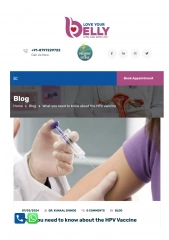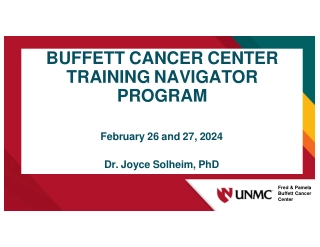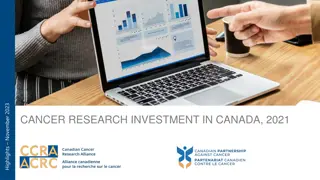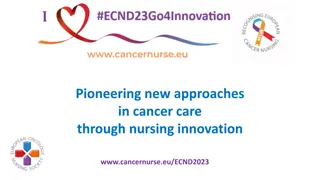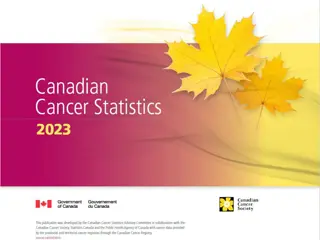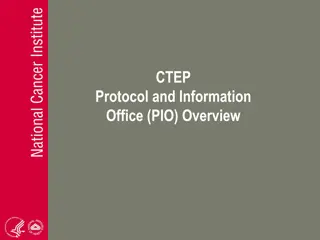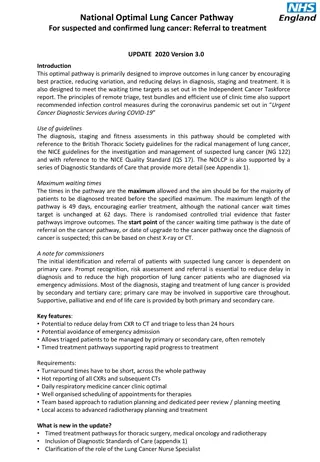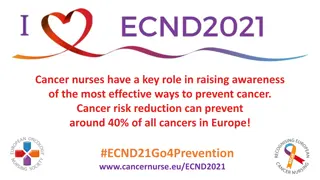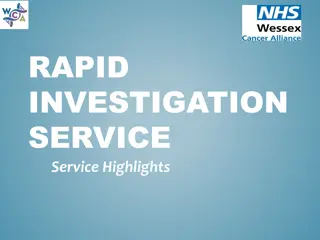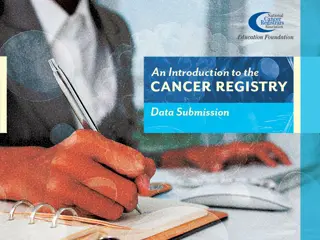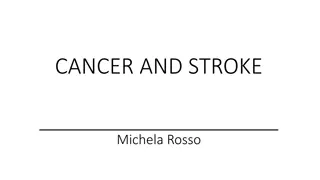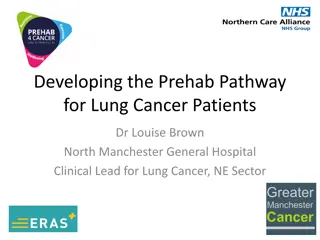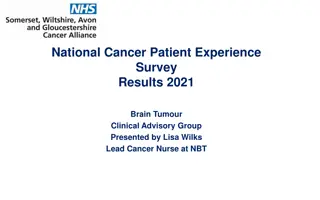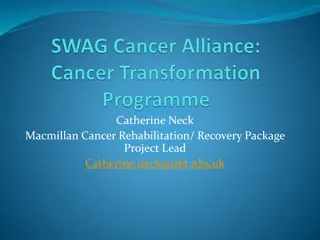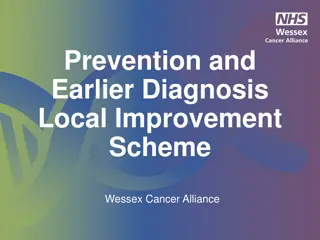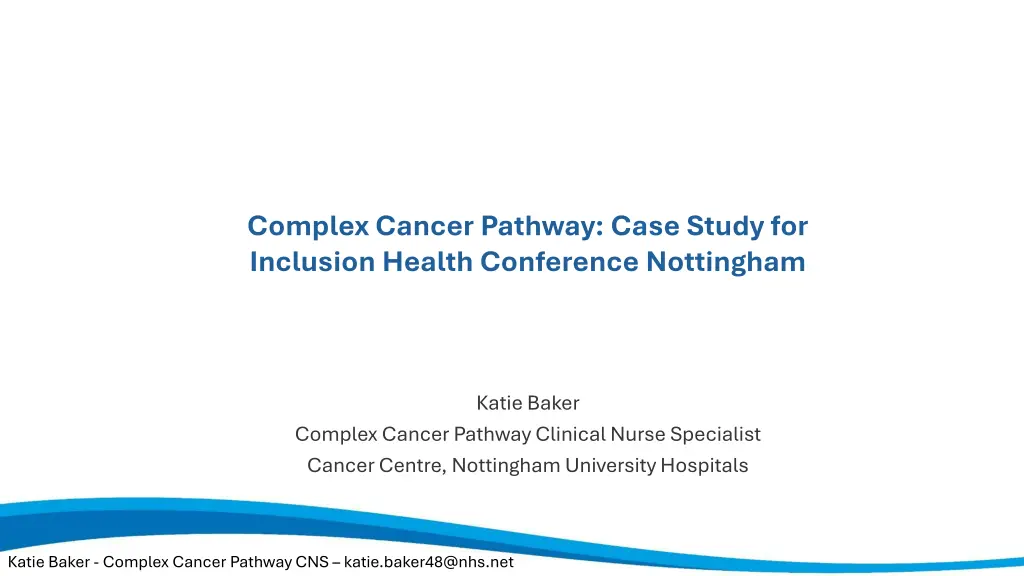
Improving Patient Support on Cancer Pathways: A Case Study by Katie Baker
Explore how Katie Baker, a Complex Cancer Pathway Clinical Nurse Specialist, addresses support gaps in cancer pathways pre-diagnosis. Learn about the role of CCP CNS, support offered, and the impact on patient care in Nottingham University Hospitals.
Download Presentation

Please find below an Image/Link to download the presentation.
The content on the website is provided AS IS for your information and personal use only. It may not be sold, licensed, or shared on other websites without obtaining consent from the author. If you encounter any issues during the download, it is possible that the publisher has removed the file from their server.
You are allowed to download the files provided on this website for personal or commercial use, subject to the condition that they are used lawfully. All files are the property of their respective owners.
The content on the website is provided AS IS for your information and personal use only. It may not be sold, licensed, or shared on other websites without obtaining consent from the author.
E N D
Presentation Transcript
Complex Cancer Pathway: Case Study for Inclusion Health Conference Nottingham Katie Baker Complex Cancer Pathway Clinical Nurse Specialist Cancer Centre, Nottingham University Hospitals Katie Baker - Complex Cancer Pathway CNS katie.baker48@nhs.net
First, some jargon-busting CNS stands for Clinical Nurse Specialist CCP CNS = Complex Cancer Pathway CNS USC referral = urgent suspected cancer referral (used to be two-week wait). Cancer pathway = patient journey from referral to diagnosis and treatment. DNA = Did not attend NUH = Nottingham University Hospitals NHS Trust covering QMC, City and Treatment Centre PTL = Patient tracking list, a list of all patients currently on the 62-day pathway at NUH (~4000- 4500 patients) Corporate PTL meeting = A filtered version of the big PTL focusing mainly on patients who have breached 62-day target. These patients are discussed in meetings with the speciality service managers and cancer centre managers to try and unblock pathways. Katie Baker - Complex Cancer Pathway CNS katie.baker48@nhs.net
Context for the role Cancer nurse leadership team at NUH identified a gap in support provision for certain patient groups while on a cancer pathway. It was felt that there is less support available for patients prior to receiving a cancer diagnosis than patients who are post-diagnosis and awaiting treatment. Often clinical nurse specialists do not engage with patients pre-diagnosis so they can focus on patients who have confirmed cancer. However, many patients would benefit from supportive input from the point of referral, and in some cases would be unable to engage without that support. It was also felt that patients who are under multiple teams at the hospital would benefit from CNS oversight to co-ordinate their appointments and assist with communication between teams. The Complex Cancer Pathway CNS (CCP CNS) started in October 2023. It was originally a secondment for one year, then extended for a further two years with funding from the Nottingham ICB. Katie Baker - Complex Cancer Pathway CNS katie.baker48@nhs.net
The role of the CCP CNS Primarily focused on patients on the corporate PTL who have already breached their cancer target of 62 days. Patients who appear disengaged (multiple DNAs, cancellations, unable to contact) are high risk for discharge back to referrer without completing diagnostics. CCP CNS identifies patients who might be struggling and reach out to those patients by phone call. The CCP CNS would then try to meet their support needs to enable the patient to engage and avoid discharge back to primary care where possible. This patient contact exposed a broad range of support needs and health inequalities which disadvantage patients from accessing timely cancer diagnostics and treatment. Katie Baker - Complex Cancer Pathway CNS katie.baker48@nhs.net
Types of support offered: Adjusting appointments Use of telephone interpretation Transport booking Appointment reminders Encourage uptake of transport cost reimbursement scheme Referral to external service i.e. Beyond Diagnosis, Macmillan or Maggie s Liaison with clinical and admin teams Referral to oncology psychology services Insight visits Liaison with key-workers Chaperone appointments Emotional support Refer to talking therapies Katie Baker - Complex Cancer Pathway CNS katie.baker48@nhs.net
Data so far Total pathways supported including dual pathway tracking and advisory only: 450 Total pathways with patients directly contacted by CCP CNS: 238 Total health inequality indicators identified affecting pathways: 255 Average day of pathway when CCP CNS gets involved: 84 Average days post-intervention patient pathway resolves: 37 days This indicates that if the CCP CNS were involved earlier, patients would be more likely to reach diagnosis and/or treatment within 62 days. Katie Baker - Complex Cancer Pathway CNS katie.baker48@nhs.net
Reasons for referral for support This graph shows the primary reason for referral to CCP CNS, however in many cases there are multiple indicators of a pathway that needs support. Total: 291 5%3% 1. Multiple DNAs 2. Support needs identified 3. Patient initiated pathway delays 4. Contact issues 5. Complex or dual pathway 6. Transport issues only 8% 8% 58% 18% For example, a complex diagnostic pathway requiring multiple procedures and scans peppered with DNAs and cancellations. Katie Baker - Complex Cancer Pathway CNS katie.baker48@nhs.net
Inclusion health concerns identified Other barriers not included in graph: - Patient is a carer - Has a carer - Financial problems - In a care home - Dementia diagnosis - Physical disability - Ethnic minority background - Previous bad experience Key health inequality indicators 1. Mental health 2. Age 3. Complex medical conditions 4. Language barrier 5. Transport issues 6. Social issues 7. Alcohol or substance use 8. Learning difficulty 9. Homelessness 6%5%3% 26% 6% 8% Many patients are affected by multiple and intersecting inclusion health concerns, creating very complex situations. 8% 24% 14% Katie Baker - Complex Cancer Pathway CNS katie.baker48@nhs.net
Patient example 1 Kathryn Head and neck urgent suspected cancer referral from dentist. On pathway day 26 when referred to me and at risk of discharge due to non-engagement. 2 x DNAs already, and 3 x previous referrals closed due to DNAs. Unable to contact on the phone. Key support needs identified No phone No family support Learning difficulty Unable to sort transport independently Mental health concern significant health anxiety after loss of her mum who was previously her main support. Katie Baker - Complex Cancer Pathway CNS katie.baker48@nhs.net
Supporting Kathryn I got through to the dental practice manager, whose number I found on the USC referral. She had put her own number on the most recent referral to see if it would make a difference. Established Kathryn s learning difficulties and frequent visits to the dental practice. We planned that the dental practice manager would phone me the next time Kathryn visited, which took a couple of weeks. Once contact established, Kathryn warmed to me and was happy for me to support and communicate with her through the manager. She agreed to come for an appointment. I liaised with the hospital administrative team on Kathryn s behalf, requested a new appointment in a reasonable timeframe, booked hospital transport and chaperoned on the day. Kathryn had a full examination and scan. No cancer was found, and she was discharged from the pathway 52 days after referral to CCP CNS having had a full assessment. Katie Baker - Complex Cancer Pathway CNS katie.baker48@nhs.net
Patient example 2: Andy Andy was on two cancer pathways on referral to CCP CNS, both on day 33. Multiple DNAs across both pathways. Key support needs identified Registered blind Could not make phone calls or read letters due to blindness Aged 93 Mobility problems Transport issues No family support, lives alone Complex dual pathways ongoing Katie Baker - Complex Cancer Pathway CNS katie.baker48@nhs.net
Supporting Andy Regular appointment reminders Transport bookings on his behalf Regular phone calls to check in Read his clinic letters out to him on the phone Converted appointments to telephone where appropriate Chaperoned appointments. Referred to Beyond Diagnosis for support at home Referred to practice nurses for continence support Andy was diagnosed with colorectal cancer and chose palliative treatment; however, he is still alive and well. Since the Salvation Army helped Andy to contact his estranged son, he now enjoys a fulfilling relationship with his son, daughter-in-law and grandchildren. Katie Baker - Complex Cancer Pathway CNS katie.baker48@nhs.net
Patient example 3: Craig Referred by specialist nurses. Difficulty contacting Craig on the phone. 4 x DNAs, 1 x attended appointment. High risk for cancer, team very concerned. I phoned Craig about 7 times over several days and eventually made contact. He agreed to a further appointment and apologised for DNAs. Key support needs identified Alcohol use, starts drinking from the morning Financial problems, on benefits Some indication from nursing team of aggressive behaviour towards staff Katie Baker - Complex Cancer Pathway CNS katie.baker48@nhs.net
Supporting Craig I told Craig about the travel cost reimbursement scheme which he qualifies for because he is on benefits . Offered referral to alcohol recovery services. Contacted Craig ahead of new appointment to remind him, but he still DNA d. We tried again. For his next appointment, I rang him at 9am on the day, and then again two hours later. The first call woke him up, and the second call prompted him to leave the house. Craig was really struggling with his drinking, and the prompting helped him remember the appointment. Once he attended, they repeated his biopsy, referred him to recovery services and got his travel costs reimbursed, which he was very happy about. He now receives support from the speciality CNS team and is engaged with them. Still awaiting final histology so unknown if confirmed cancer or cancer excluded at this time. Katie Baker - Complex Cancer Pathway CNS katie.baker48@nhs.net
What have we learnt? Katie Baker - Complex Cancer Pathway CNS katie.baker48@nhs.net
What have we learnt? Patients don t DNA appointments to deliberately waste NHS time. There is usually a very good reason or a support need behind every DNA. It is simply not enough to send someone an appointment in the post. We must challenge attitudes that place responsibility back onto the patient without exploring their support needs first. Avoid expecting patients to respond to the health information the way we would ourselves. A flexible, personalised approach is best. For many patients, cancer is not the first thing on their mind, so it s more important to work alongside that patient to make their cancer pathway fit into their other priorities. Technical medical language is exclusive and does not cater to the needs of our population and their level of health literacy. We would like to influence changing all our medical letters to have a reduced reading age to match the reading age of our population including outside of cancer. Empathy goes a long way. Not using withheld caller ID patients call me back! Patients appreciate having a person they can call easily. By meeting the needs of the most disadvantaged we improve accessibility for everyone. Katie Baker - Complex Cancer Pathway CNS katie.baker48@nhs.net
Evolution of the role and future aspirations Within the first three months, it was felt we needed a system to identify patients at the point of referral. It is impossible, currently, to know which patients have the highest support needs. CCP CNS is trialling a focus on patients at day 0-10 of their pathway who have missed their first appointment. This is to explore whether this enables identification of patients with barriers to access earlier on in their pathway. New links with Nottingham Wellbeing Hub and Nottingham Recovery Network to provide joined-up support for patients affected by substance use and cancer. Started a collaborative project with the Mary Potter Centre where if a GP feels a patient will struggle to engage with cancer services, they can refer to the CCP CNS at the same time as submitting USC referral - hoping to extend to more practices soon. Aim to start using eHealthscope in the future to stratify risk of disengagement for new cancer referrals. Roll out inclusion health training for staff working in cancer specialties. Katie Baker - Complex Cancer Pathway CNS katie.baker48@nhs.net
Thank you! Contact details: Katie Baker Katie.baker48@nhs.net 07812277912 0115 969 1169 ext. 78367 Referral criteria: - Patient is on an active cancer pathway - Patient is over 18 - Identified barrier, delay or blockage affecting patient s ability to access cancer services. Katie Baker - Complex Cancer Pathway CNS katie.baker48@nhs.net

